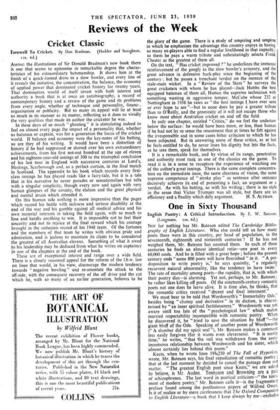Reviews of the Week
Cricket Classic
AMONG the illustrations of Sir Donald Bradman's new book there is one that seems to epitomise in remarkable degree the charac- teristics of his extraordinary batsmanship. It shows him at the finish of a quick-footed drive to a slow bowler, and every line of it reveals the initiative, the concentration, the balance, the economy of applied power that dominated cricket history for twenty years. That domination would of itself invest with both interest and authority a book that is at once an autobiography, a record of contemporary history and a review of the game and its problems from every angle, whether of technique and personality, financ, , organisation or publicity. But to many its appeal will lie at least as much in its manner as its matter, reflecting as it does so vividly the very qualities that made its author the cricketer he was.
In these days of so much " ghosting " it is stimulating indeed to feel on almost every page the impact of a personality that, whether as batsman or captain, was for a generation the focus of the cricket world. If balance and economy were the key-notes of his batting, so are they of his writing. It would have been a distortion of history if he had suppressed OF slurred over his own extraordinary achievements, from his first not-out hundred at the age of eleven and his eighteen-year-old innings of 300 to the triumphal conclusion of his last tour in England with successive centuries at Lord's, Hastings, Scarborough and, as a perfect curtain, in the final match in Scotland. The appendix to his book which records every first- class innings he has played reads like a fairy-tale, but it is a tale that in his narrative he never parades or sensationalises but tells with a singular simplicity, though every now and again with very human glimpses of the anxiety, the elation and the great physical and mental strain which attended it.
On this human side nothing is more impressive than the pages which record his battle with sickness and serious disability at the end of the war and his gamble against all medical advice and his own material interests in taking the field again, with so much to lose and hardly anything to win. It is impossible not to feel their sincerity and not to rejoice at the final reward which his courage brought in the unbeaten record of his 1948 team. Of the fortunes and the members of that team he writes with obvious pride and admiration, and is jealous to maintain its claim to be considered the greatest of all Australian elevens. Something of what it owed to his leadership may be deduced from what he writes on captaincy in one of the chapters at the end of the book.
These are of exceptional interest and range over a wide field. There is a closely reasoned appeal for the reform of the 1.b.w. law on lines that would, in his view, discourage the modern tendency towards " negative bowling " and re-orientate the attack to the off-side, with the consequent recovery of the off drive and the cut which he, with so many of an earlier generation, believes to be the glory of the game. There is a study of umpiring and umpires in which he emphasises the advantage this country enjoys in having so many ex-players able to find a regular livelihood in that capacity ; to them he pays a warm tribute and unhesitatingly selects Frank Chester as the greatest of them all.
On the text, " Has cricket improved ?" he underlines the immense reinforcement of the googly to the slow bowler's armoury, and the great advance in defensive back-play since the beginning of the century ; but he passes a trenchant verdict on the menace of the stale-mate wicket. In a " Review of the Stars " he surveys the great cricketers with whom he has played—Jack Hobbs the best equipped batsman of them all, Hutton the supreme technician with something wanting in aggressive temper, McCabe whose 232 at Nottingham in 1938 he rates as " the best innings I have ever seen or ever hope to see "—but to none does he pay a greater tribute than to O'Reilly, and the generosity of it will not escape those who know most about Australian cricket on and off the field.
In only one chapter, entitled " Critics," do we feel the undertow below the surface: he would have been more, or less, than human if he had not let us sense the resentment that at times he felt against the irresponsible and in some cases bitter criticism to which he has been subjected. But in answering some of these critics, as at last he feels entitled to do, he never loses his dignity but lets the facts, as he sees them, speak for themselves.
It is a remarkable book, and by virtue of its range, penetration and authority must rank as one of the classics on the game. To read it is in a sense to recapture the experience of watching one of the author's great innings. There is the same complete concentra- tion on the immediate issue, the same clearness of vision, the same supreme competence of " stroke play " as sentence after sentence decisively achieves its end of presenting a fact, an argument or a verdict. As with his batting, so with his writing ; there is no style in the sense that Victor Trumper was all style, but there are an efficiency and a finality which defy argument. H. S. ALTHAM.


































 Previous page
Previous page